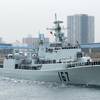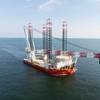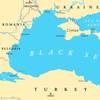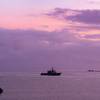Countering piracy, or any other threat, comes naturally to U.S. Navy personnel patrolling critical sea lanes around the world, and October was been a busy month for those monitoring pirate activities off the east coast of Africa.
On October 30, a U.S. Navy destroyer answered a call for help -- relayed through the International Maritime Bureau -- from the North Korean crew on a vessel that had been overtaken by pirates in international waters October 29.
The USS James Williams dispatched a helicopter to the sugar-laden Dai Hong Dan, poised 60 nautical miles off the coast of Somalia, to investigate the situation.
The helicopter confirmed the plight of the ship -- the pirates had taken control of the ship’s bridge while the crew was confined to the steering and engineering areas -- and the destroyer headed to the scene. Upon its arrival, the Navy demanded the pirates surrender.
The arrival of U.S. assistance emboldened the North Koreans to take on the pirates, and a gun battle ensued that left two pirates dead and five captured. Although the North Korean crew regained control of their ship, three members were wounded in the fight.
U.S. Navy medics were invited on board to treat the wounded. The North Korean sailors were transferred to the American destroyer for medical treatment and later returned to their vessel. The five surviving pirates were kept under guard on the North Korean ship, which returned to the Somali port of Mogadishu.
A coalition vessel destroyed the two pirate skiffs so they would not be used again for nefarious purposes.
Piracy is an ongoing problem along the Somali coast. Some of the pirates are connected to Somali clans and have been outfitted with sophisticated weapons and tracking equipment.
In a separate incident in October, a Panamanian-flagged ship sent out a distress call in the Gulf of Aden. U.S. and coalition forces from Australia, France, Germany, Italy, Pakistan, the United Kingdom and other nations are monitoring the situation. [Source: http://usinfo.state.gov]
Sponsored Content
Maritime leaders unite to tackle ocean plastic with launch of new alliance: the Maritime Association for Clean Seas

ABS Wavesight Advantage™: One Intelligent, Connected Maritime Platform to Transform Complexity into Operational Clarity

Subscribe for
Maritime Reporter E-News
Maritime Reporter E-News is the maritime industry's largest circulation and most authoritative ENews Service, delivered to your Email five times per week









